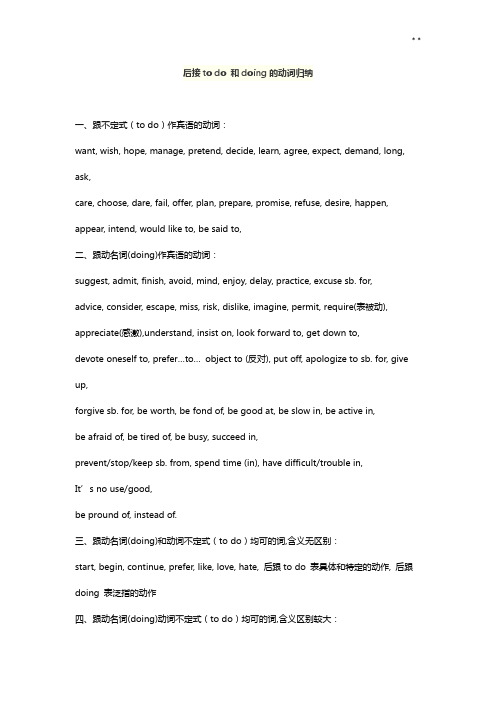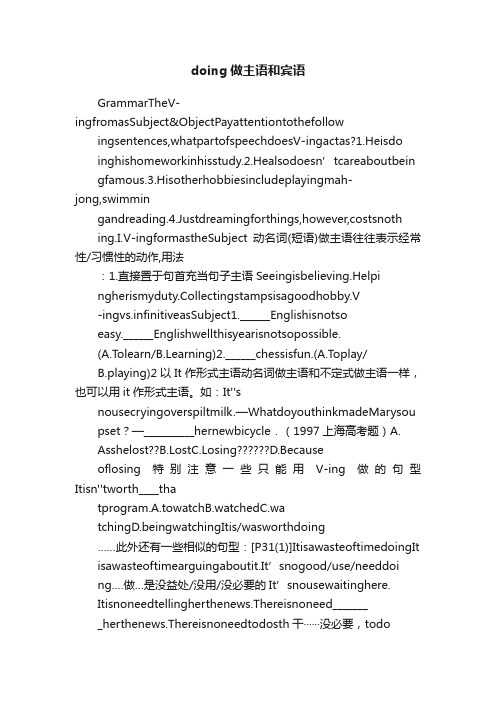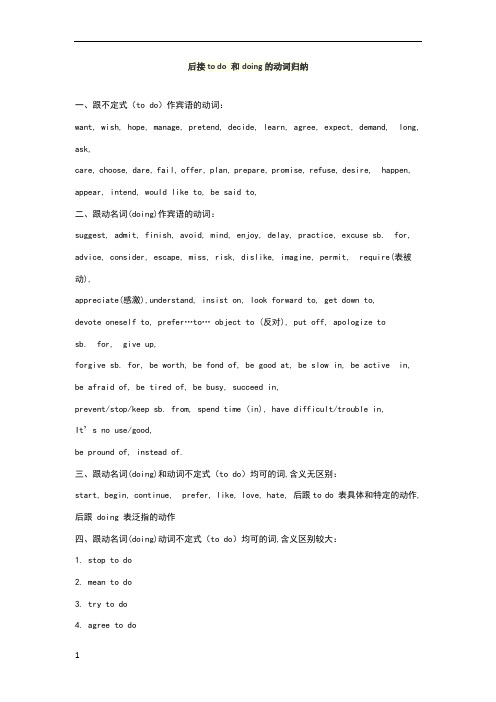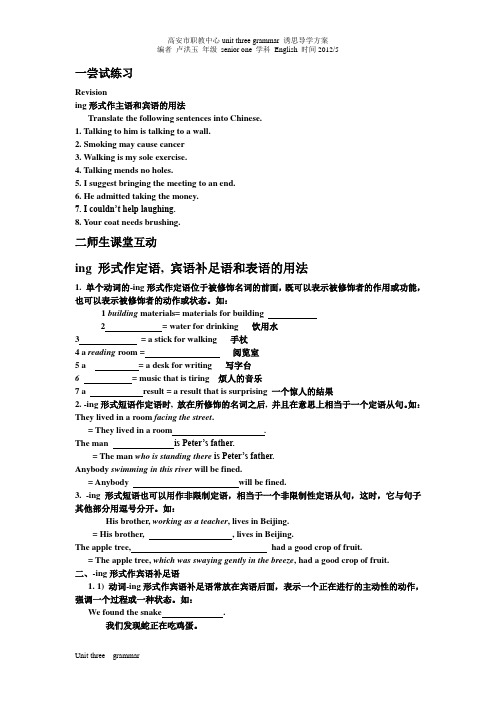doing做宾语
动词后加doing的归纳

后接to do 和doing的动词归纳一、跟不定式(to do)作宾语的动词:want, wish, hope, manage, pretend, decide, learn, agree, expect, demand, long, ask,care, choose, dare, fail, offer, plan, prepare, promise, refuse, desire, happen, appear, intend, would like to, be said to,二、跟动名词(doing)作宾语的动词:suggest, admit, finish, avoid, mind, enjoy, delay, practice, excuse sb. for, advice, consider, escape, miss, risk, dislike, imagine, permit, require(表被动), appreciate(感激),understand, insist on, look forward to, get down to,devote oneself to, prefer…to…object to (反对), put off, apologize to sb. for, give up,forgive sb. for, be worth, be fond of, be good at, be slow in, be active in,be afraid of, be tired of, be busy, succeed in,prevent/stop/keep sb. from, spend time (in), have difficult/trouble in,It’s no use/good,be pround of, instead of.三、跟动名词(doing)和动词不定式(to do)均可的词,含义无区别:start, begin, continue, prefer, like, love, hate, 后跟to do 表具体和特定的动作, 后跟doing 表泛指的动作四、跟动名词(doing)动词不定式(to do)均可的词,含义区别较大:1. stop to do2. mean to do3. try to do4. agree to dostop doing mean doing try doing agree to sb doing5. be afraid to do6. remember to do7. forget to do8. allow/permit/advise sb. to dobe afraid of doing remember doing forget doing allow/permit/advise doing9. regret to do10. want to do11. need to do12. go on to doregret doing want doing (表被动) need(表被动) go on doing13. can’t help to do14. forbid sb. to do=forbid sb’s doingcan’t help doing forbid doing15.感官动词+ doing/to do感官动词see, watch, observe, notice, look at, hear, listen to, smell, taste, feel + do 表示动作的完整性,真实性;+doing 表示动作的连续性,进行性I saw him work in the garden yesterday.昨天我看见他在花园里干活了.(强调"我看见了"这个事实)I saw him working in the garden yesterday.(强调"我见他正干活"这个动作)昨天我见他正在花园里干活.典型例题1)They knew her very well. They had seen her ___ up from childhood.A. growB. grewC. was growingD. to grow答案:A.因题意为,他们看着她长大,因此强调的是成长的过程,而非正在长的动作,因此用see sb do sth 的句型.2)The missing boy was last seen ___ near the river.A. playingB. to be playingC. playD. to play答案A. 本题强调其动作,正在河边玩,应此用see sb. doing sth句型中学英语中哪些动词后加to do sth和加doing sth一、接不定式(而不接动名词)作宾语的24个常用动词afford to do sth. 负担得起做某事agree to do sth. 同意做某事arrange to do sth.安排做某事ask to do sth. 要求做某事beg to do sth. 请求做某事choose to do sth. 决定做某事decide to do sth. 决定做某事demand to do sth. 要求做某事determine to do sth. 决心做某事expect to do sth. 期待做某事fear to do sth. 害怕做某事help to do sth. 帮助做某事hope to do sth. 希望做某事learn to do sth. 学习做某事manage to do sth. 设法做某事offer to do sth. 主动提出做某事plan to do sth. 计划做某事prepare to do sth. 准备做某事pretend to do sth. 假装做某事promise to do sth. 答应做某事refuse to do sth. 拒绝做某事want to do sth. 想要做某事wish to do sth. 希望做某事注:有些不及物动词后习惯上也接不定式,不接动名词:aim to do sth. 打算做某事fail to do sth. 未能做某事happen to do sth. 碰巧做某事hesitate to do sth. 犹豫做某事struggle to do sth. 努力做某事二、接不定式作宾补的36个常用动词advise sb. to do sth. 建议某人做某事allow sb. to do sth. 允许某人做某事ask sb. to do sth.请(叫)某人做某事bear sb. to do sth.忍受某人做某事beg sb. to do sth. 请求某人做某事cause sb. to do sth. 导致某人做某事command sb. to do sth. 命令某人做某事drive sb. to do sth .驱使某人做某事elect sb. to do sth. 选举某人做某事encourage sb. to do sth. 鼓励某人做某事expect sb. to do sth. 期望某人做某事forbid sb. to do sth. 禁止某人做某事force sb. to do sth. 强迫某人做某事get sb. to do sth. 使(要)某人做某事hate sb. to do sth. 讨厌某人做某事help sb. to do sth. 帮助某人做某事intend sb. to do sth. 打算要某人做某事invite sb. to do sth. 邀请某人做某事leave sb. to do sth. 留下某人做某事like sb. to do sth. 喜欢某人做某事mean sb. to do sth. 打算要某人做某事need sb. to do sth. 需要某人做某事oblige sb. to do sth. 迫使某人做某事order sb. to do sth. 命令某人做某事permit sb. to do sth. 允许某人做某事persuade sb. to do sth. 说服某人做某事prefer sb. to do sth. 宁愿某人做某事request sb. to do sth. 要求某人做某事remind sb. to do sth. 提醒某人做某事teach sb. to do sth .教某人做某事tell sb. to do sth. 告诉某人做某事train sb. to do sth. 训练某人做某事trouble sb. to do sth. 麻烦某人做某事want sb. to do sth. 想要某人做某事warn sb. to do sth. 警告某人做某事wish sb. to do sth. 希望某人做某事注:不要受汉语意思的影响而误用以下动词句型:汉语说:“害怕某人做某事”,但英语不说fear sb. to do sth.。
doing是动名词,还是现在分词?

doing是动名词,还是现在分词?有网友问,think of sb. doing sth 的意思是“想到某人做某事”。
请问其中的 doing sth 是动名词还是现在分词,是宾语还是宾语补足语。
我的想法是:如果这个doing是动名词,那它就是宾语(其前的sb.可看作它的逻辑主语)。
如果这个doing 是现在分词,那它就是宾补。
还有下面这个句子:He squirmed visibly at the thought of his secret being revealed. 一想到秘密被揭穿,他明显地局促不安。
请问句中的 being revealed 是带逻辑主语的宾语还是宾语补足语?是动名词还是现在分词?解答你的问题之前,我们先看 think of doing sth 的含义。
think of 的基本意思是“想起,想到”。
(当然也有“考虑”和“认为”的意思,暂不讨论)think of doing sth.意思就是“想到干某事,想起做某事”,例如:Do be careful while you are ill. Don't think of doing any homework. 在生病期间,要多注意休息,不要去想做作业。
就本句而言,think of 后面的 doing any homework 是动名词短语,作介词 of 的宾语。
在实际语言中,有时候为了说明动名词动作的发出者,需要在动名词之前加上一个逻辑主语:Whenever she thought of Tom staring at her, she felt sick. 每当想到汤姆盯着自己看的那个样子,她就感到恶心。
(Tom staring at her,我们称之为“动名词的复合结构”,或“含有逻辑主语的动名词短语”,作of 的宾语。
)同样,你的句子:He squirmed visibly at the thought of his secret being revealed. 一想到秘密被揭穿,他明显地局促不安。
动词-ing形式作主语和宾语

一、动词-ing形式作主语和宾语考点一:动词-ing形式的基本用法动词-ing具有名词的性质,可在句中担当主语、宾语、标语、定语、宾语补足语和状语,动词-ing形式作主语常用来表示经常性和习惯性的动作。
动词-ing形式作主语通常放在句首。
但不能单独做谓语。
考点二:动词-ing做主语的用法:1)动词-ing作主语时,往往表示习惯性、经常性的动作,在口语中也表示具体的动作。
如:Paiting is his hobby.2)动词-ing形式作主语和不定式作主语一样,也可以用it做形式主语,但不定式作主语往往表示具体的特别是将来的动作。
如:It is no use talking without doing.光说不做是没用的It is so hot. what I want to do now is to have a swim in a river.天这么热,现在我想做的事情就是在河里游泳。
动词-ing形式作主语时,为了保持句子平衡,可以用it作形式主语。
常用的结构:1. It is + no use / no good / useless etc.+ v-ing2. It is + nice / good / interesting / a waste of…etc. + v-ing例如:It is no use crying over spilt milk.事考点三:动词-ing形式作宾语的用法1.有些动词或动词短语常用动词-ing形式作宾语:admit,avoid,appreciate,consider,enjoy,escape,finish,keep,mind, miss, suggest等动词; can’t stand, give up, feel like, keepon, think of, set about, dream of等短语。
避免错过少延期建议完成多练习喜欢想象禁不住承认否定与嫉妒逃避冒险xxxx忍受保持不介意考虑欣赏还愿意2.在下列短语中,to是介词,后面应用动词-ing形式作宾语:be / get us ed to, look forward to, devote…to, pay attention to,object to等。
doing做主语和宾语

doing做主语和宾语GrammarTheV-ingfromasSubject&ObjectPayattentiontothefollowingsentences,whatpartofspeechdoesV-ingactas?1.Heisdoinghishomeworkinhisstudy.2.Healsodoesn’tcareaboutbein gfamous.3.Hisotherhobbiesincludeplayingmah-jong,swimmingandreading.4.Justdreamingforthings,however,costsnothing.I.V-ingformastheSubject动名词(短语)做主语往往表示经常性/习惯性的动作,用法:1.直接置于句首充当句子主语Seeingisbelieving.Helpingherismyduty.Collectingstampsisagoodhobby.V-ingvs.infinitiveasSubject1.______Englishisnotsoeasy.______Englishwellthisyearisnotsopossible.(A.T olearn/B.Learning)2.______chessisfun.(A.Toplay/B.playing)2以It作形式主语动名词做主语和不定式做主语一样,也可以用it作形式主语。
如:It''snousecryingoverspiltmilk.—WhatdoyouthinkmadeMarysou pset?—__________hernewbicycle.(1997上海高考题)A.Asshelost??B.LostC.LosingD.Becauseoflosing特别注意一些只能用V-ing做的句型Itisn''tworth____thatprogram.A.towatchB.watchedC.watchingD.beingwatchingItis/wasworthdoing……此外还有一些相似的句型:[P31(1)]ItisawasteoftimedoingIt isawasteoftimearguingaboutit.It’snogood/use/needdoing….做…是没益处/没用/没必要的It’snousewaitinghere.Itisnoneedtellingherthenews.Thereisnoneed________herthenews.Thereisnoneedtodosth干······没必要,todo不可换为doing.III.V-ingasObject1.V-ing做动词宾语1).Ihavejustfinished____myhomework.A.todoB.doingC.beingdoneD.done2.V-ing做介词宾语1).Hedroveawaywithout______good-by.A.sayingB.tosayC.saysD.said2).Hehasn’tgotusedto___inabigcity.A.liveB.livingC.livedD.lives3.动词forget,goon,mean,regret,remember,stop,try,beusedto,can''thelp后跟动名词和跟不定式区别较大,须注意。
动词后加doing的归纳

后接to do 和doing的动词归纳一、跟不定式(to do)作宾语的动词:want, wish, hope, manage, pretend, decide, learn, agree, expect, demand, long, ask,care, choose, dare, fail, offer, plan, prepare, promise, refuse, desire, happen, appear, intend, would like to, be said to,二、跟动名词(doing)作宾语的动词:suggest, admit, finish, avoid, mind, enjoy, delay, practice, excuse sb. for, advice, consider, escape, miss, risk, dislike, imagine, permit, require(表被动),appreciate(感激),understand, insist on, look forward to, get down to,devote oneself to, prefer…to… object to (反对), put off, apologize tosb. for, give up,forgive sb. for, be worth, be fond of, be good at, be slow in, be active in, be afraid of, be tired of, be busy, succeed in,prevent/stop/keep sb. from, spend time (in), have difficult/trouble in,It’s no use/good,be pround of, instead of.三、跟动名词(doing)和动词不定式(to do)均可的词,含义无区别:start, begin, continue, prefer, like, love, hate, 后跟to do 表具体和特定的动作, 后跟 doing 表泛指的动作四、跟动名词(doing)动词不定式(to do)均可的词,含义区别较大:1. stop to do2. mean to do3. try to do4. agree to dostop doing mean doing try doing agree to sb doing5. be afraid to do6. remember to do7. forget to do8. allow/permit/advise sb. to dobe afraid of doing remember doing forget doing allow/permit/advise doing9. regret to do10. want to do11. need to do12. go on to doregret doing want doing (表被动) need(表被动) go on doing13. can’t help to do14. forbid sb. to do=forbid sb’s doingcan’t help doing forbid doing15.感官动词 + doing/to do感官动词 see, watch, observe, notice, look at, hear, listen to, smell, taste, feel + do 表示动作的完整性,真实性;+doing 表示动作的连续性,进行性I saw him work in the garden yesterday.昨天我看见他在花园里干活了.(强调"我看见了"这个事实)I saw him working in the garden yesterday.(强调"我见他正干活"这个动作)昨天我见他正在花园里干活.典型例题1)They knew her very well. They had seen her ___ up from childhood.A. growB. grewC. was growingD. to grow答案:A.因题意为,他们看着她长大,因此强调的是成长的过程,而非正在长的动作,因此用see sb do sth 的句型.2)The missing boy was last seen ___ near the river.A. playingB. to be playingC. playD. to play答案A. 本题强调其动作,正在河边玩,应此用see sb. doing sth句型中学英语中哪些动词后加to do sth和加doing sth 一、接不定式(而不接动名词)作宾语的24个常用动词afford to do sth. 负担得起做某事agree to do sth. 同意做某事arrange to do sth.安排做某事ask to do sth. 要求做某事beg to do sth. 请求做某事care to do sth. 想要做某事choose to do sth. 决定做某事decide to do sth. 决定做某事demand to do sth. 要求做某事determine to do sth. 决心做某事expect to do sth. 期待做某事fear to do sth. 害怕做某事help to do sth. 帮助做某事hope to do sth. 希望做某事learn to do sth. 学习做某事manage to do sth. 设法做某事offer to do sth. 主动提出做某事plan to do sth. 计划做某事prepare to do sth. 准备做某事pretend to do sth. 假装做某事promise to do sth. 答应做某事refuse to do sth. 拒绝做某事want to do sth. 想要做某事wish to do sth. 希望做某事注:有些不及物动词后习惯上也接不定式,不接动名词:aim to do sth. 打算做某事fail to do sth. 未能做某事long to do sth. 渴望做某事happen to do sth. 碰巧做某事hesitate to do sth. 犹豫做某事struggle to do sth. 努力做某事二、接不定式作宾补的36个常用动词advise sb. to do sth. 建议某人做某事allow sb. to do sth. 允许某人做某事ask sb. to do sth.请(叫)某人做某事bear sb. to do sth.忍受某人做某事beg sb. to do sth. 请求某人做某事cause sb. to do sth. 导致某人做某事command sb. to do sth. 命令某人做某事drive sb. to do sth .驱使某人做某事elect sb. to do sth. 选举某人做某事encourage sb. to do sth. 鼓励某人做某事expect sb. to do sth. 期望某人做某事forbid sb. to do sth. 禁止某人做某事force sb. to do sth. 强迫某人做某事get sb. to do sth. 使(要)某人做某事hate sb. to do sth. 讨厌某人做某事help sb. to do sth. 帮助某人做某事intend sb. to do sth. 打算要某人做某事invite sb. to do sth. 邀请某人做某事leave sb. to do sth. 留下某人做某事like sb. to do sth. 喜欢某人做某事mean sb. to do sth. 打算要某人做某事need sb. to do sth. 需要某人做某事oblige sb. to do sth. 迫使某人做某事order sb. to do sth. 命令某人做某事permit sb. to do sth. 允许某人做某事persuade sb. to do sth. 说服某人做某事prefer sb. to do sth. 宁愿某人做某事request sb. to do sth. 要求某人做某事remind sb. to do sth. 提醒某人做某事teach sb. to do sth .教某人做某事tell sb. to do sth. 告诉某人做某事train sb. to do sth. 训练某人做某事trouble sb. to do sth. 麻烦某人做某事want sb. to do sth. 想要某人做某事warn sb. to do sth. 警告某人做某事wish sb. to do sth. 希望某人做某事注:不要受汉语意思的影响而误用以下动词句型:汉语说:“害怕某人做某事”,但英语不说fear sb. to do sth.。
动词后加doing的归纳

后接to do 和doing的动词归纳一、跟不定式(to do)作宾语的动词:want, wish, hope, manage, pretend, decide, learn, agree, expect, demand, long, ask,care, choose, dare, fail, offer, plan, prepare, promise, refuse, desire, happen, appear, intend, would like to, be said to,二、跟动名词(doing)作宾语的动词:suggest, admit, finish, avoid, mind, enjoy, delay, practice, excuse sb. for, advice, consider, escape, miss, risk, dislike, imagine, permit, require(表被动),appreciate(感激),understand, insist on, look forward to, get down to,devote oneself to, prefer…to… object to (反对), put off, apologize tosb. for, give up,forgive sb. for, be worth, be fond of, be good at, be slow in, be active in, be afraid of, be tired of, be busy, succeed in,prevent/stop/keep sb. from, spend time (in), have difficult/trouble in,It’s no use/good,be pround of, instead of.三、跟动名词(doing)和动词不定式(to do)均可的词,含义无区别:start, begin, continue, prefer, like, love, hate, 后跟to do 表具体和特定的动作, 后跟 doing 表泛指的动作四、跟动名词(doing)动词不定式(to do)均可的词,含义区别较大:1. stop to do2. mean to do3. try to do4. agree to dostop doing mean doing try doing agree to sb doing5. be afraid to do6. remember to do7. forget to do8. allow/permit/advise sb. to dobe afraid of doing remember doing forget doing allow/permit/advise doing9. regret to do10. want to do11. need to do12. go on to doregret doing want doing (表被动) need(表被动) go on doing13. can’t help to do14. forbid sb. to do=forbid sb’s doingcan’t help doing forbid doing15.感官动词 + doing/to do感官动词 see, watch, observe, notice, look at, hear, listen to, smell, taste, feel + do 表示动作的完整性,真实性;+doing 表示动作的连续性,进行性I saw him work in the garden yesterday.昨天我看见他在花园里干活了.(强调"我看见了"这个事实)I saw him working in the garden yesterday.(强调"我见他正干活"这个动作)昨天我见他正在花园里干活.典型例题1)They knew her very well. They had seen her ___ up from childhood.A. growB. grewC. was growingD. to grow答案:A.因题意为,他们看着她长大,因此强调的是成长的过程,而非正在长的动作,因此用see sb do sth 的句型.2)The missing boy was last seen ___ near the river.A. playingB. to be playingC. playD. to play答案A. 本题强调其动作,正在河边玩,应此用see sb. doing sth句型中学英语中哪些动词后加to do sth和加doing sth一、接不定式(而不接动名词)作宾语的24个常用动词afford to do sth. 负担得起做某事agree to do sth. 同意做某事arrange to do sth.安排做某事ask to do sth. 要求做某事beg to do sth. 请求做某事care to do sth. 想要做某事choose to do sth. 决定做某事decide to do sth. 决定做某事demand to do sth. 要求做某事determine to do sth. 决心做某事expect to do sth. 期待做某事fear to do sth. 害怕做某事help to do sth. 帮助做某事hope to do sth. 希望做某事learn to do sth. 学习做某事manage to do sth. 设法做某事offer to do sth. 主动提出做某事plan to do sth. 计划做某事prepare to do sth. 准备做某事pretend to do sth. 假装做某事promise to do sth. 答应做某事refuse to do sth. 拒绝做某事want to do sth. 想要做某事wish to do sth. 希望做某事注:有些不及物动词后习惯上也接不定式,不接动名词:aim to do sth. 打算做某事fail to do sth. 未能做某事long to do sth. 渴望做某事happen to do sth. 碰巧做某事hesitate to do sth. 犹豫做某事struggle to do sth. 努力做某事二、接不定式作宾补的36个常用动词advise sb. to do sth. 建议某人做某事allow sb. to do sth. 允许某人做某事ask sb. to do sth.请(叫)某人做某事bear sb. to do sth.忍受某人做某事beg sb. to do sth. 请求某人做某事cause sb. to do sth. 导致某人做某事command sb. to do sth. 命令某人做某事drive sb. to do sth .驱使某人做某事elect sb. to do sth. 选举某人做某事encourage sb. to do sth. 鼓励某人做某事expect sb. to do sth. 期望某人做某事forbid sb. to do sth. 禁止某人做某事force sb. to do sth. 强迫某人做某事get sb. to do sth. 使(要)某人做某事hate sb. to do sth. 讨厌某人做某事help sb. to do sth. 帮助某人做某事intend sb. to do sth. 打算要某人做某事invite sb. to do sth. 邀请某人做某事leave sb. to do sth. 留下某人做某事like sb. to do sth. 喜欢某人做某事mean sb. to do sth. 打算要某人做某事need sb. to do sth. 需要某人做某事oblige sb. to do sth. 迫使某人做某事order sb. to do sth. 命令某人做某事permit sb. to do sth. 允许某人做某事persuade sb. to do sth. 说服某人做某事prefer sb. to do sth. 宁愿某人做某事request sb. to do sth. 要求某人做某事remind sb. to do sth. 提醒某人做某事teach sb. to do sth .教某人做某事tell sb. to do sth. 告诉某人做某事train sb. to do sth. 训练某人做某事trouble sb. to do sth. 麻烦某人做某事want sb. to do sth. 想要某人做某事warn sb. to do sth. 警告某人做某事wish sb. to do sth. 希望某人做某事注:不要受汉语意思的影响而误用以下动词句型:汉语说:“害怕某人做某事”,但英语不说fear sb. to do sth.。
doing在句中作宾语

doing在句中作宾语Doing can be used as an object in a sentence when an action is being described. For example, "He enjoys doing crossword puzzles in his free time." Here, "doing crossword puzzles" is the object of the verb "enjoys."In daily life, we often use "doing" as an object in various situations. It can refer to activities, tasks, or actions that we perform. From household chores to hobbies, from work-related responsibilities to leisure activities, the concept of "doing" as an object in a sentence is quite common.In terms of length, a response of 1500 words or more might include a detailed discussion of the various ways in which "doing" can be used as an object in different types of sentences. This could involve examples of using "doing" in simple sentences, complex sentences, and compound sentences. It could also include an exploration of the various verb tenses and forms that can be used with "doing" as an object, as well as the different types of objects that "doing" can refer to.Furthermore, a longer response might delve into the nuances of using "doing" in different contexts, such as formal writing, informal communication, and professional discourse. It could also explore the potential impact of using "doing" as an object on the overall meaningand tone of a sentence, as well as on the structure and flow of a piece of writing.In addition, a detailed discussion of "doing" as an object in a sentence might include a comparison of its usage in various languages, highlighting similarities and differences in how this concept is expressed linguistically.In conclusion, the use of "doing" as an object in a sentence is a common and versatile aspect of language. A thorough exploration of this topic could provide valuable insights into the structure and function of language, as well as its impact on communication and expression.。
doing 做宾语和主语

一尝试练习Revisioning形式作主语和宾语的用法Translate the following sentences into Chinese.1. Talking to him is talking to a wall.2. Smoking may cause cancer3. Walking is my sole exercise.4. Talking mends no holes.5. I suggest bringing the meeting to an end.6. He admitted taking the money.7. I couldn’t help laughing.8. Your coat needs brushing.二师生课堂互动ing 形式作定语, 宾语补足语和表语的用法1. 单个动词的-ing形式作定语位于被修饰名词的前面,既可以表示被修饰者的作用或功能,也可以表示被修饰者的动作或状态。
如:1 building materials= materials for building2 = water for drinking 饮用水3 = a stick for walking 手杖4 a reading room = 阅览室5 a = a desk for writing 写字台6 = music that is tiring 烦人的音乐7 a result = a result that is surprising 一个惊人的结果2. -ing形式短语作定语时, 放在所修饰的名词之后, 并且在意思上相当于一个定语从句。
如:They lived in a room facing the street.= They lived in a room .The man is Peter’s father.= The man who is standing there is Peter’s father.Anybody swimming in this river will be fined.= Anybody will be fined.3. -ing形式短语也可以用作非限制定语,相当于一个非限制性定语从句,这时,它与句子其他部分用逗号分开。
doing做定语和宾语补足语和表语

Revision
-ing形式作主语和宾语的用法 Translate the following sentences into Chinese. 1. Talking to him is talking to a wall.
对他说话等于对牛弹琴。
2. Smoking may cause cancer.
10. As is known to us all, traveling is _____, but we often feel _____ when we are back from travels. A. interesting; tired B. interested; tiring C. interesting; tiring D. interested; tired
他们住在一间面朝街的房子。
The man standing there is Peter’s father. = The man who is standing there is Peter’s father.
站在那儿的那个人是彼得的父亲。
Anybody swimming in this river will be fined. = Anybody who is swimming in this river will be fined.
他承认钱是他拿的。
7. I couldn’t help laughing.
我禁不住笑了起来。
8. Your coat needs brushing.
你的大衣需要刷一下。
-ing 形式作定语, 宾语补足语和表语的用法 一、-ing形式作定语
1. 单个动词的-ing形式作定语位于被修饰 名词的前面,既可以表示被修饰者的作用 或功能,也可以表示被修饰者的动作或状 态。如:
doing做主语和宾语

doing做主语和宾语GrammarTheV-ingfromasSubject&ObjectPayattentiontothefollowingsentences,whatpartofspeechdoesV-ingactas?1.Heisdoinghishomeworkinhisstudy.2.Healsodoesn’tcareaboutbeingfamous.3.Hisotherhobbiesincludeplayingmah-jong,swimmingandreading.4.Justdreamingforthings,however,costsnothing.I.V-ingformastheSubject动名词(短语)做主语往往表⽰经常性/习惯性的动作,⽤法:1.直接置于句⾸充当句⼦主语Seeingisbelieving.Helpingherismyduty.Collectingstampsisagoodhobby.V-ingvs.infinitiveasSubject1.______Englishisnotsoeasy.______Englishwellthisyearisnotsopossible.(A.Tolearn/B.Learning)2.______chessisfun.(A.Toplay/B.playing)2以It作形式主语动名词做主语和不定式做主语⼀样,也可以⽤it作形式主语。
如:It''s nousecryingoverspiltmilk.—WhatdoyouthinkmadeMarysoupset?—__________hernewbicycle.(1997上海⾼考题)A.Asshelost??B.LostC.Losing??????D.Becauseoflosing特别注意⼀些只能⽤V-ing做的句型Itisn''tworth____thatprogram.A.towatchB.watchedC.watchingD.beingwatchingItis/wasworthdoing……此外还有⼀些相似的句型:[P31(1)]ItisawasteoftimedoingItisawasteoftimearguingaboutit.It’snogood/use/needdoing….做…是没益处/没⽤/没必要的It’snousewaitinghere.Itisnoneedtellingherthenews.Thereisnoneed________herthenews.Thereisnoneedtodosth⼲······没必要,todo不可换为doing.III.V-ingasObject1.V-ing做动词宾语1).Ihavejustfinished____myhomework.A.todoB.doingC.beingdoneD.done2.V-ing做介词宾语1).Hedroveawaywithout______good-by.A.sayingB.tosayC.saysD.said2).Hehasn’tgotusedto___inabigcity.A.liveB.livingC.livedD.lives3.动词forget,goon,mean,regret,remember,stop,try,beusedto,can''thelp后跟动名词和跟不定式区别较⼤,须注意。
to__do__与doing做宾语的区别总结

to__do__与doing做宾语的区别总结to do 与doing 做宾语的区别总结动词使⽤原形:1. Will / Would you please + ( not ) + V(原)….?2.Why not +V(原)….? = Why don’t you + V(原)3. had better ( not ) +V(原)加动词不定式省to :使役动词或感官动词后加动词不定式省to:1. let / make / have sb. do…让/使某⼈做…2. watch /see / hear / notice / feel sb. do ….. 注意:在主动语态中省to 的不定式在被动语态中要加to对⽐:1.hear / see sb. do…听见 / 看见…做了…hear / see sb. doing…. 听见 / 看见…正做…used to do… 过去常常做2. be / get/ become used to doing …习惯于做be used for doing… 被⽤于做….be used to do ….. 被⽤于做….动词后⾯加不定式:1. tell sb.(not ) to do… 告诉某⼈(不)做… ask sb.( not ) to do…叫某⼈(不)做…2. want to do ..= would like to do … 想做….3. want sb. to do.. = would like sb to do.. 想要某⼈做.. .4. plan to do .. 计划做…5. begin to do…, start to do…, start packing6. try to do.. 努⼒/尽⼒做… try to learn English well7. children love to play this game 8. call to do … 打电话做…9. hope to do… , hope( that) +句⼦ 10. be sorry to do… 很抱歉做…11. encourage sb. to do … ⿎励某⼈做 …. 12. help (sb) (to) do…13. get sb. to do…. 使某⼈做某事… 14. learn to do….学做….15. teach sb. to do…. 教某⼈做… 16. decide to do …. 决定做….17. wish sb. to do …. 希望/愿某⼈做某事 18. allow sb. to do…允许某⼈做….19. warn sb. not to do… 警告某⼈不要做… 20. deserve to do.. 注定做…21. (can’t) afford to do…(不能)负担得起做…22.can’t wait to do…迫不及待做..23. seem to do …似乎要做… 24. be to do … 将要做…25. refuse to do…. 拒绝做….. 26. agree to do…..同意做…..27. expect to do…. 期望做…. 28. expect sb. to do ….期望某⼈做……29. set one’s mind to do…. ⼀⼼想做某事30. make up one’s mind to do….下定决⼼做某事31. prefer to do …… rather than do…..宁愿做…⽽不做…32. It takes sb. some time to do sth. 花某⼈多长时间做某事33. It’s + adj. + (for sb. ) to do ….. (对于某⼈)做某事adj.34. sb. finds it … to do….. 某⼈发现做某事…..35. It’s better / best ( for sb.) to do… 较好/最好做….接动名词:1. enjoy doing…, enjoy oneself2. finish doing…3. hate doing… 讨厌做….4. be good at sth. = do well in sth.be good at doing …= do well in doing…..5. what / how about doing…?6. thank sb. for doing….感谢某⼈做….7. have fun doing… 做…有乐趣8. have problems / difficult doing…做……有困难/问题9. give up doing….放弃做… 10. take part in doing…. (积极)参加做….11. make a contribution to doing….12. practise doing… 13. be worth doing… 值得做…14. feel like doing…. 想要做…. 15. be interested in doing…16. by doing… 通过,以…. 17. the way of doing….做….的⽅法18. keep doing…⼀直做… 19. keep sb. doing…让某⼈⼀直做…keep on doing …反复做….20. succeed in doing…成功做某事21. be busy doing….22. spend ….(in) doing….花时间/钱做…23. can’t help doing …. 禁不住/ 情不⾃禁做某事24. instead of doing….. 代替做某事25. prefer doing …. to doing…宁愿做…⽽不是做… ; 较喜欢做…⽽不是做….20. keep / stop / prevent sb. from doing….. 阻⽌某⼈做某事19. mind (sb. / one’s)doing … 介意(某⼈)做….既可加不定式,⼜可加动名词, 但有区别:1.like doing… 表⽰⼀般情况like to do.. 喜欢/愿意做…表⽰具体谋⼀次情况2. remember to do…记得要做…3. forget to do… 忘记要做…remember doing….记得做过…. forget doing…. 忘记做过…4. stop to do…停下来做..(另⼀件事)stop doing…停⽌做….. 6. be afraid to do…不敢做…;害怕做…;5. go on to do… 继续做另⼀件事be afraid of sth. 害怕某物go on doing…. 继续做同⼀件事be afraid of doing…害怕做…7. need to do….. 需要做…..need doing ……(某物/⼈) 需要被….。
